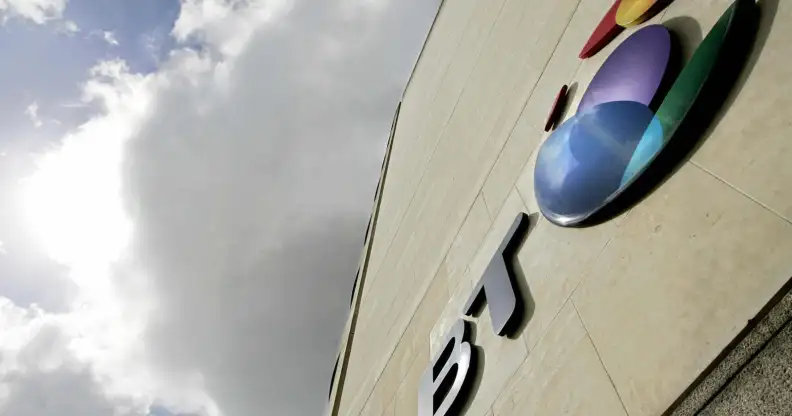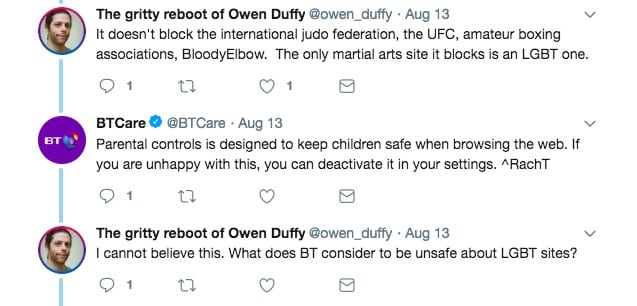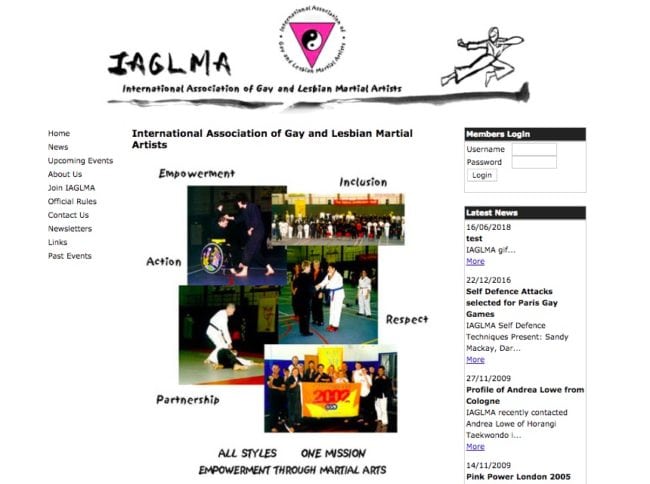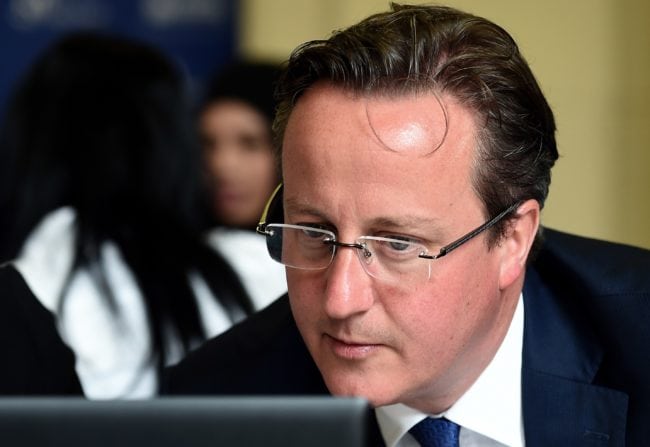BT blocked a LGBT martial arts website, but couldn’t explain why

The British Telecom (BT) logo is pictured in London, 18 May 2006 (Shaun Curry/AFP/Getty)
Telephone and internet provider BT has admitted that it “miscategorised” an LGBT+ martial arts organisation’s website, which was blocked under its parental control features.
Glasgow-based BT subscriber Owen Duffy told PinkNews he was unable to access the International Association of Gay and Lesbian Martial Artists (IAGLMA) homepage, after discovering the group while reading about the 2018 Gay Games in Paris.
“They looked like an interesting group because in martial arts you do sometimes [encounter] homophobic attitudes,” Duffy told PinkNews.
However, when he tried to visit the group’s website for more information, Duffy found that it had been restricted.
BT and other internet providers allow users to regulate websites that they deem inappropriate for younger audiences, including pornography and gambling sites.
“I looked it up on a different connection and there was nothing objectionable on it,” said Duffy.
Duffy contacted BT about the issue via Twitter.
Duffy expressed his concern that BT’s parental controls were blocking the martial arts website on the principle of it featuring LGBT+ content. In response, he was told the issue with the website may be that it was about martial arts. He then pointed out that no other martial arts-related website was subject to the block.
“It doesn’t block the international judo federation, the UFC, amateur boxing associations, BloodyElbow. The only martial arts site it blocks is an LGBT one,” he wrote.
“Parental controls is designed to keep children safe when browsing the web. If you are unhappy with this, you can deactivate it in your settings,” a member of the BTCare team responded.
This response baffled Duffy, who identifies as bisexual. “It reinforces negative impressions that people have about LGBT+ people in sports,” he said.

Owen Duffy was baffled by the BTCare response (Screenshot/Twitter)
Eventually, as he kept pushing for an explanation, he was told that a reason could not be provided at present and that the issue had been forwarded to a different team.
Duffy did not receive any more updates, but BT told PinkNews that they looked into the matter, finding that the website had been placed in the wrong category—without specifying which one this was.
“The categorisation of websites for BT’s Parental Controls filter is conducted by our third party supplier. This website was miscategorised and has now been corrected,” a statement from a BT spokesperson read.
“If any customer feels a particular website is miscategorised they can email [email protected] for review. Customers can also add any sites that they believe have been blocked or allowed incorrectly to their personal lists,” it added.

The website iaglma.org was blocked under BT parental control (Screenshot/iaglma)
Duffy told PinkNews that he is still concerned about the way the customer support staff treated his request and that he’d like to see a donation made to the organisation LGBT Youth Scotland.
The inclusion of LGBT+ content to parental control blocking was highlighted by PinkNews in 2013, when it emerged that TalkTalk was preventing access to the LGBT+ Liberal Democrats website via its HomeSafe filter.
At the time, Prime Minister David Cameron had taken on the cause of preventing children from accessing pornographic content online, promoting family-friendly internet filters.

British Prime Minister David Cameron pushed for internet filters (Paul Ellis/AFP/Getty)
Cameron’s initiative was criticised as extending far beyond explicit content to an attempt to reorganise internet content into what was “acceptable” and “unacceptable,” as publications like Wired and The New Statesman noted at the time.
The BT categories of controversial content are a reflection of Cameron’s initiative. They include: pornography, drugs, alcohol and tobacco, hate and self-harm, nudity, weapons and violence, gambling, dating, social networking, file sharing, games, media streaming, obscene and tasteless, fashion and beauty, homework, search engines and portals and sex education.
The sex education category caused controversy when it was introduced, as it included a reference to restricting content deemed to be about “gay and lesbian lifestyle.”
BT has since amended its sex education category to read: “This category is intended to prevent very young children from being exposed to sites that have a significant focus on subjects that might come up in a sex education programme. Parents should carefully consider the possible adverse effects from denying children of an appropriate age access to information on these issues.”

